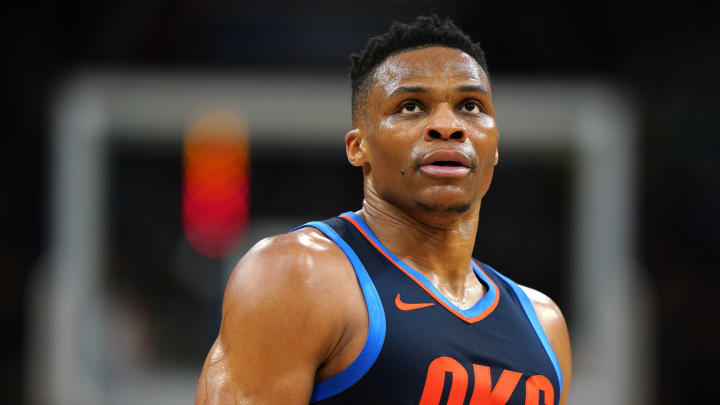The NBA Must Heed Russell Westbrook’s Words and Keep Fans Accountable

There’s enough plausible deniability for people to say they’ll never be wholly sure of what happened between Russell Westbrook and two Utah Jazz fans, a husband and wife, on the night Russ said some particularly strong toward the stands. Westbrook and his teammates say the fans told Russ to “get down on your knees like you’re used to,” while the husband after the game claimed he simply told Westbrook to ice up his knees as the wife remained uninvolved. What’s undeniable after the exchange is that only one party will be held accountable for their actions moving forward, and it’s probably the wrong one.
There’s a reason why when Russ is talking back to the fan, 45-year-old Shane Keisel, the video being circulated of the interaction focuses only on the basketball player and not the person he’s conversing with. After the game, Keisel agreed to be interviewed by the local news and ESPN, presumably 100% by his own choice. Westbrook, on the other hand, had several cameras in his face like he does after every game, never by his own choice. All the Jazz did to the chatty fan after the incident was issue a warning card, while the NBA—though seemingly unlikely—has the authority to fine or suspend Westbrook for what he said in the video.
(By the way, Keisel deleting his Twitter after some, uh, controversial comments were found is kind of poetic after he willingly put his face on the news. He folded after one night of scrutiny into his actions. I’m sure some people will soon turn him into a hero.)
Another route the NBA could take is one standing firmly on the side of its own player, something the league seems hesitant to do in situations such as this one. I understand fans are the financial backbone of the league—those massive TV contracts neatly coincided with improving ratings for live games—but the league can’t be so nervous about offending the public that it keeps the players at arm’s length when they feel unfairly treated while doing their job.
Westbrook may seem short tempered because of his growing list of exchanges with fans. It’s more likely he‘s normal tempered, and justifiably tired of some of the inane verbal abuse he hears on a near-nightly basis. To some extent, Westbrook has to endure the taunts as part of his job. He deftly handled the kid who reached out and poked him in Denver, while the kid was largely given a pass. Russ even often has fun with his villainous persona, like when he eagerly called for more boos during the Thunder’s overtime win against the Blazers a few days before the Jazz game. But reacting harshly to players when they snap back—or simply not reacting at all—needs to stop, because it only furthers the idea that players simply exist for the entertainment purposes of the NBA’s fans, and aren’t, you know, actual humans.
It would be refreshing instead to see the NBA intervene on the side of its players, the most important part of the product. Adam Silver can’t quite condemn fans (I’m not so much sympathetic to Silver as much as I am being realistic), but even a statement from the league condemning verbal abuse and telling teams its fans are a reflection on the organization could help build some good will between the league office and players.
When Silver talked about players’ unhappiness during his Sloan Sports chat with Bill Simmons, he briefly mentioned them feeling isolated, though mostly as a result of social media or technology. Wouldn’t an incident like this one make Westbrook feel even more isolated? A customer can come to Westbrook’s job and be as disrespectful as they want, and in most cases, enjoy a cloak of anonymity that would protect them from any consequences. Meanwhile, Westbrook is expected to endure the abuse with a jolly attitude, lest he threaten his own livelihood by responding the way most people would in the same situation. Meanwhile, outside of his teammates or co-workers, no authoritative body is really taking a disciplined stand in Westbrook’s defense, not wanting to upset the consumers of its product. The players, then, are left on an island to plead their case.
I don’t expect the NBA to make sweeping societal changes as a result of this one incident. The consequences of capitalism and the problematic history of how black athletes are viewed won’t be fixed with one statement. But just once in my life I would like to see a full-hearted defense from the league of the player in a situation like this. The headlines will read that Russell Westbrook threatened a fan instead of saying he defended himself. The NBA can help change that narrative if it wants to. Until then, as long as the players are being held to a much higher standard than the people hurling insults at them, the league shouldn’t be surprised when exchanges like this one continue to happen.

Rohan Nadkarni covers the NBA for SI.com. The Mumbai native and resident fashion critic has written for GQ.com, Miami Herald and Deadspin.